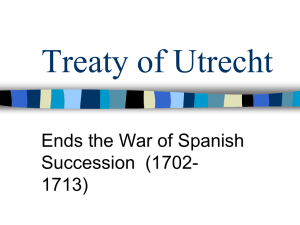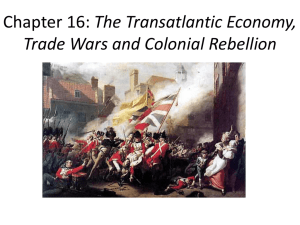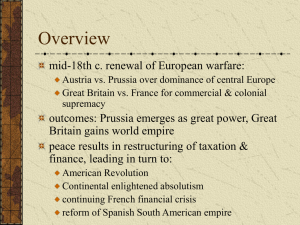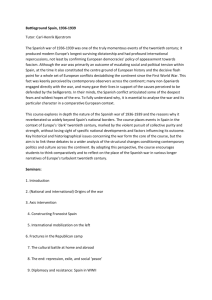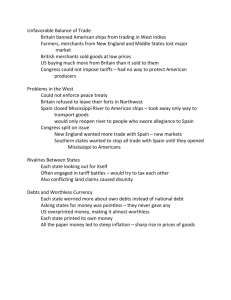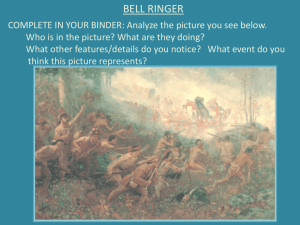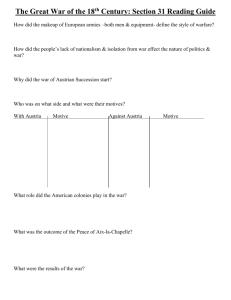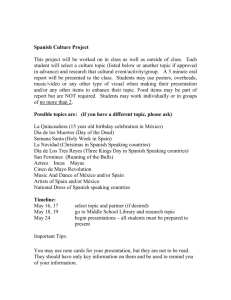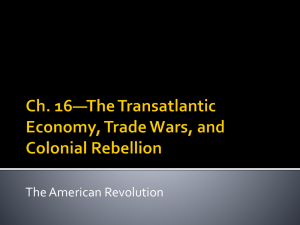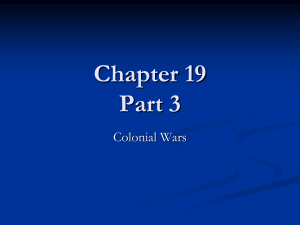Ch. 16 - Elizabeth School District
advertisement
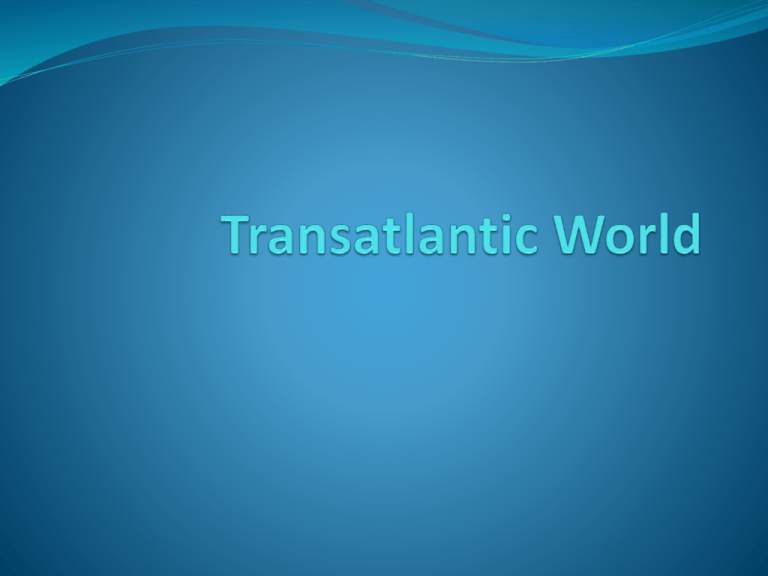
Four Distinct Phases of European Contact with rest of World Discovery, exploration, initial conquest and settlement Colonial trade among Spain, France, and Britain European Imperialism in Africa and Asia (19th century) Decolonization of peoples previously under European Rule (20th century) Treaty of Utrecht 1713 Established boundaries of empire until 1750s Spain British French Dutch (technically – Would lose majority of holdings) Mercantilism The economic theory behind the system of acquiring colonies Governments regulate trade and commerce Home country primary concern Colonies provide resources; Home country industries and protection Navigation laws, tariffs, and bounties to encourage production and discourage trade with other empires http://www.youtube.com/watch?v=B3u4EFTwprM The West Indies and Indian Subcontinent Great sources of rivalries Possessed resources that appealed to Europeans Spain Prior to Colonization Reconquista- Christian Crusade to recover Spain (Iberian Peninsula from Islamic control) Spanish Colonial System Prior to 1750s Initial Exploration is funded by crown (begins 1500s) Spanish Conquer- Well organized societies (Aztecs; Incas) Ecomienda- Natives give tribute to Spanish Conquerors Flota System- Control supplies and bullion that went to and from Spain. No outside trade Establish government that is regulated by the Spanish crown British Colonial System Prior to 1750s Begins in 1600s Initial exploration is funded by Join-stock companies (No crown regulation Colonists establish own government Government leaders respond to investors Minimal government interaction Charles III 1759-1788 French Bourbon Abolished Spanish Monopolies Opened more South American Ports to trade and commerce Attempted to Increase taxes and end corruption (smuggling and illicit trade) Intendent- District Administrator- Bring Empire under Spanish Control King George III and British Empire 1760s- 1776 Attempts to Reassert control over British colonies Introduces several taxes attempt to control commerce and trade Opposite of Charles III of Spain Slave Labor Fundamental aspect of empire building Sugar Becomes most valuable export Natives died of disease from old world caused a demand for labor Imported Africans from Central Africa, Sierra Leone, Gold Coast Plantation System Established High Mortality rates drove constant need for slaves The War of Jenkins Ear Spain and England Disagreed over British rights to Spanish market in the West Indies 1731 Spaniards cut off ear of English Captain Robert Jenkins (Claims to be Commercial but in reality a Pirate) 1738- Robert Jenkins appears before parliament 1739- War begins when Robert Walpole (British Prime Minister) responds to pressure to stop Spanish intervention in trade The War of Austrian Succession In 1740 Frederick II of Prussia seized Silesia, an Austrian Providence belonging to Habsburgs Cardinal Fleury, minister to Louis XV (France) supported Prussian aggression against Austria British feel threatened by this; Desire for Low Countries to remain in Austrian Control and not French 1744- British French conflict expands to new world. France supported Spain against British 1748- Ends in stalemate The Diplomatic Revolution 1756 Involved a Series of alliances that set the stage for larger European conflict Convention of Westminster Alliance aimed at preventing troops from entering Germany Britain allies with Austria Austria allies with France with the goal to crush Prussia Seven Years War 1756-1763 Same time as French and Indian War in Colonies Frederick II of Prussian invasion of Saxony Led to France, Austria, Sweden, Russia, and small German states agree to destroy Prussia Russia and Prussia made Peace Frederick II held of Austria and France William Pitt (England)- used soldiers in American Colonies, Canada, and India to fight France across the globe and gain English possessions Treaty of Paris 1763 France and Britain Britain Receive all of Canada, Ohio River Valley, eastern half of Mississippi Valley Britain Returns Pondicherry and Chadermangore in India; West Indian Islands of Guadeloupe and Martinique The American Revolution and Europe Britain Attempts to place Seven Years War debt on to American Colonist (who fought in the war) Attempts to reassert control Taxation without Representation 1764 Sugar Act; 1765 Stamp Act 1770- Boston Massacre 1773- Boston Tea Party (first of several) 1783 Treaty of Paris Fighting ends in 1781- Washington defeats Cornwallis in Yorktown with the help of France and Spain Treaty of Paris Concluded conflict Colonist establish government based on popular consent rather than divine law or monarchy
